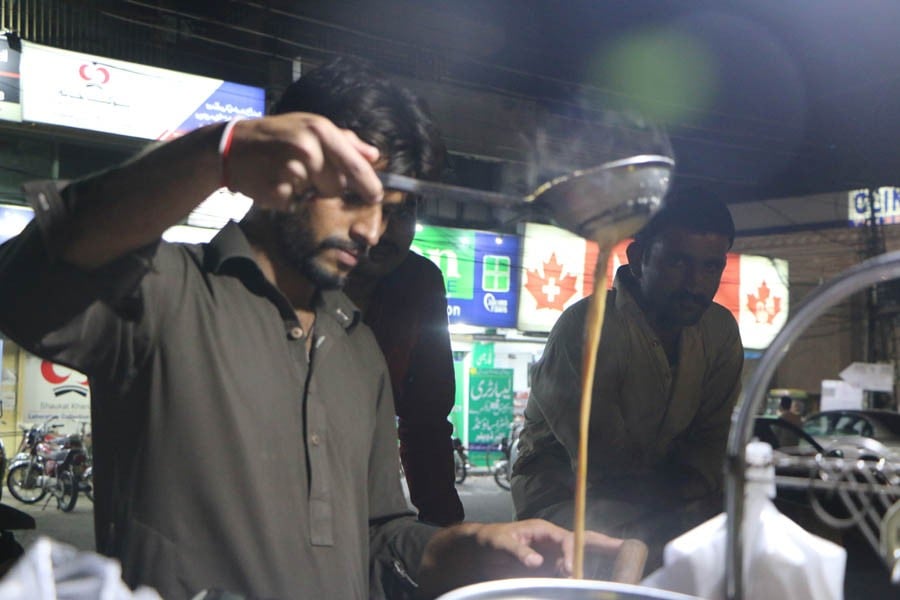
A very basic tea stall, set up on a pushcart, next to Jinnah Hospital, attracts customers -- mostly patients’ attendants -- craving a hot cuppa, while the rest of the city sleeps

The corridors and wards of Jinnah Hospital, Lahore, are eerily silent in the dead of the night. As the patients go to sleep, their attendants wait for the night to pass. For them, chai (vernacular for tea) is the way to perk up and break the tedium, albeit temporarily.
Enter Naveed, a 20-something guy, in Malaysia shalwar-kameez, with a mobile kitchen on a pushcart, parked right in front of the hospital. All told, he sells tea till the wee hours of the day, throughout the week. He begins at around 10 in the night.
Naveed’s customers are generally people stepping out of Jinnah -- patients’ visitors, rickshaw drivers, security guards -- and also random individuals who often stop by to satiate their cravings for a hot cuppa.
He tells TNS that he’s been running this little, makeshift stall for the past almost eight years now. It’s his "family business;" his father first set up a kiosk in front of the many pharmacies that line the road across the Jinnah Hospital gate.
The next minute, Naveed goes quiet, as if he isn’t willing to divulge any more details on his personal life, and attends to a customer who’s just arrived.
While he is busy, another customer pops in and is curious to know if I am part of the oh-so-famous Punjab Food Authority (PFA) inspection teams. I can see where he’s coming from. Over the past two or more years, the PFA has raided several food outlets, restaurants, and roadside vendors in the city selling or keeping substandard items, and sealed and fined many that didn’t measure up to the food quality criteria.
I assure him I’m not a PFA employee. But before he’s heard me, he begins his jeremiad: "You should visit the canteen inside the hospital; they fleece us. We came here for the treatment of our patient, and have to deal with rough treatment at the hands of the paramedical staff. And, when we want to sit down and relax at the end of an exhausting day, we can’t even get a decent cup of tea!"
Fortunately, Naveed’s customers have no such complaints against the tea variety he offers. And, boy, it’s a heady mix -- ‘doodh patti,’ for instance, is made with milk, tea leaves, and sugar boiled together to a certain consistency. It can be made strong or light depending on the consumer’s taste, by adding or reducing the amount of tea leaves. Naveed has creatively cooked up "secret recipes" that he appears quite guarded about. However, the few ‘magical’ ingredients I manage to note, on my visit to the stall, are cardamom (ilaichi), and white and brown sugar that he mixes together and keeps in a large, water-tight jar.
Naveed says that he uses up to 15 litres of milk, 2 kg tea leaves, and 2 kg or more of sugar at the stall every day. Plain tea is sold for Rs20 in ceramic cups, if you’re having it at the spot, or Rs25, if you would like takeaway in disposable cups.
These days, getting pure and fresh milk is a huge issue. However, Naveed claims he has his own milk procurement system. Additionally, at his stall, he keeps it cold by virtue of ice slabs. The result, as his customers claim, is a healthy cup of tea.
For Kashif, a regular at the stall, "The tea [offered here] is not just tasty, it also agrees with your stomach. I can’t even begin to compare it with the canteen tea that’s terrible."
Unmindful of anyone have any conversations around him, Naveed carries on with his work regime. He prefers to stay silent. But, he might be listening to you intently. No wonder his customers love to share anecdotes with him.
I want to ask him why he chose this very spot for his tea stall. "It pays well," pat comes his reply.
His customers are all praise for him. Mumtaz Bibi, an old lady, says, "I came to Jinnah [Hospital] all the way from Multan, to look after my niece who is admitted here. I didn’t have enough money to buy tea from the canteen, so I chanced on this stall.
"His [Naveed’s] tea is not only refreshing but also affordable," she adds.
This little chai stall, on an extremely busy Usmani Road, benefits greatly from its location. It generally attracts the patients’ attendants and visitors who are on their way out of the hospital or stop for a breather. As Bibi puts it, a hospital is a place where you see the suffering humanity. At the dhaba, we sit down for a few moments, and share and listen to each other’s stories, over cups of tea. It helps us unwind."
It also helps them develop compassion. To quote Bibi again, "At times the customers pay for the less privileged, so that the latter can also enjoy tea without adding a burden on their pocket."
One common grouse that most customers I speak to is that the hospital canteen managers use tea bags and tetra pack milk, which the customers don’t have a taste for. "We like it [tea] karrak (strong)," says Kashif. This Naveed specialises in.
As sun shoots its first rays of the day in the sky, the flame of the stove at Naveed’s stall slowly dies out. Early morning birds are heard chirping in the background, while a rickshaw driver pulls along. He wants to have what shall be the stall’s final few cups of tea.
Eventually, Naveed washes the reusable cups and hangs them on a metal stand to dry. The rest of the things have been neatly stacked in the cart. It’s time to push off.